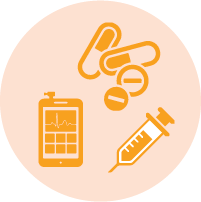

EDCTP portfolio: Emerging diseases
index


The Lib-Regul-Trials project is building the capacity of Liberia’s national regulatory authority to monitor drug safety and oversee clinical research more effectively.
Boosting regulatory capacity in Liberia

Liberia’s national regulatory authority, the Liberia Medicines and Health Products Regulatory Authority (LMHRA) is relatively young, having been established in 2010. It has a particular focus on combating counterfeit drugs, a major problem in West Africa. For example, more than 120,000 children’s lives may be lost each year because of substandard antimalarial drugs.
The LMHRA is also responsible for approving clinical trials in Liberia. During the 2014–16 West Africa Ebola outbreak, three major international trials of Ebola vaccines and therapeutics were launched, which highlighted that the LMHRA was ill-prepared to assist, review and oversee ongoing clinical trials in the country. This contributed to the slow start of clinical studies, which only began when the outbreak was nearing its end.
The challenge

The Lib-Regul-Trials project is strengthening the capacity of the LMHRA to carry out its core functions, including review and oversight of clinical research.
The project is supporting a review and updating of the country’s regulatory framework for clinical research. A new electronic system is being introduced to facilitate submission, review and monitoring of clinical trial proposals. The skills of LMHRA staff in clinical research oversight are being developed, in areas such appraisal of clinical trial applications, Good Clinical Practice, clinical trials monitoring and pharmacovigilance.
Relationships are being strengthened with other regulatory authorities to ensure closer adherence to international standards, and links are being built with institutional review boards and international organisations involved in strengthening and harmonising the work of national regulatory authorities.
The project

The Lib-Regul-Trials project will build the LMHRA’s capacity in drug safety monitoring, a national priority area, and in clinical trial oversight. It will ensure that lessons are learned from the 2014–2016 West Africa Ebola outbreak and that the country is better prepared to respond effectively and rapidly to proposals to carry out research in outbreak settings. This will ensure that it is fully able to protect the health of its citizens through the comprehensive review of clinical protocols and monitoring of ongoing clinical trials.
Impact


“
test the safety and efficacy of this new formulation in young children
”
Bringing antiretroviral drugs to children

The CHAPAS trials have ensured that many more children with HIV have benefited
from life-saving antiretrovirals.
EDCTP portfolio: HIV & HIV-associated infections
The challenge
Liberia’s national regulatory authority, the Liberia Medicines and Health Products Regulatory Authority (LMHRA) is relatively young, having been established in 2010. It has a particular focus on combating counterfeit drugs, a major problem in West Africa. For example, more than 120,000 children’s lives may be lost each year because of substandard antimalarial drugs.
The LMHRA is also responsible for approving clinical trials in Liberia. During the 2014–16 West Africa Ebola outbreak, three major international trials of Ebola vaccines and therapeutics were launched, which highlighted that the LMHRA was ill-prepared to assist, review and oversee ongoing clinical trials in the country. This contributed to the slow start of clinical studies, which only began when the outbreak was nearing its end.

The Lib-Regul-Trials project is strengthening the capacity of the LMHRA to carry out its core functions, including review and oversight of clinical research.
The project is supporting a review and updating of the country’s regulatory framework for clinical research. A new electronic system is being introduced to facilitate submission, review and monitoring of clinical trial proposals. The skills of LMHRA staff in clinical research oversight are being developed, in areas such appraisal of clinical trial applications, Good Clinical Practice, clinical trials monitoring and pharmacovigilance.
Relationships are being strengthened with other regulatory authorities to ensure closer adherence to international standards, and links are being built with institutional review boards and international organisations involved in strengthening and harmonising the work of national regulatory authorities.
The project
The later CHAPAS-3 trial compared the efficacy and safety of three fixed-dose combinations including two without stavudine (found to have some long-term side effects in adults, leading to a recommendation that its use be discontinued in children). The trial the first of its kind in Africa studied nearly 500 children at four sites in two African countries.
The Lib-Regul-Trials project will build the LMHRA’s capacity in drug safety monitoring, a national priority area, and in clinical trial oversight. It will ensure that lessons are learned from the 2014–2016 West Africa Ebola outbreak and that the country is better prepared to respond effectively and rapidly to proposals to carry out research in outbreak settings. This will ensure that it is fully able to protect the health of its citizens through the comprehensive review of clinical protocols and monitoring of ongoing clinical trials.
ratios forfixed-dose combinations and on appropriatedosage according to weight.
The CHAPAS-3 trial confirmed the effectiveness of fixed-dose combinations, providing further impetus to the rollout of antiretrovirals to children. Its evidence on abacavir informed the WHO recommendation of abacavir-containing combinations for first-line therapy in children. Trial data have also been used to support applications for regulatory approval for new scored efavirenz tablets.
Impact
L’homme RF et al. Nevirapine, stavudine and lamivudine pharmacokinetics in African children on paediatric fixed-dose combination tablets. AIDS. 2008;22(5):557–65.
Mulenga V et al. Abacavir, zidovudine, or stavudine as paediatric tablets for African HIVinfected children (CHAPAS-3): an open-label, parallel-group, randomised controlled trial. Lancet Infect Dis. 2016;16(2):169–79.
WHO. Guidelines on the use of antiretroviral drugs for treating and preventing HIV infection: recommendations for a public health approach. 2010.
WHO. Consolidated guidelines on the use of antiretroviral drugs
for treating and preventing
HIV infection: Recommendations for a public health approach
(second edition). 2016
Projects: Children with HIV in Africa Pharmacokinetics and Adherence of Simple Antiretroviral Regimens (CHAPAS): CHAPAS-1 and -3
Project lead: Professor Chifumbe Chintu, University Teaching Hospital, Zambia (CHAPAS-1); Dr Veronica Mulenga, University Teaching Hospital, Zambia (CHAPAS-3)
Target population(s): Children with HIV
Sample size: 71 (CHAPAS-1); 480 (CHAPAS-3)
Countries involved: Ireland, the Netherlands, the UK, the USA, Zambia (CHAPAS-1); Uganda, Zambia (CHAPAS-3)
Project duration: 2005–2009 (CHAPAS-1); 2010 –2011 (CHAPAS-3)
EDCTP funding: €1.2M (CHAPAS-1); €4.6M (CHAPAS-3)
Total project funding: €1.2M (CHAPAS-1); €5.0M